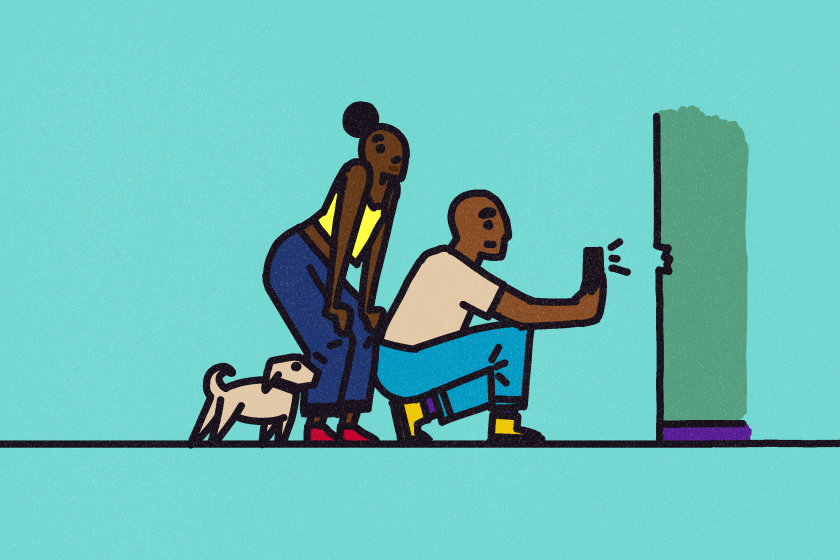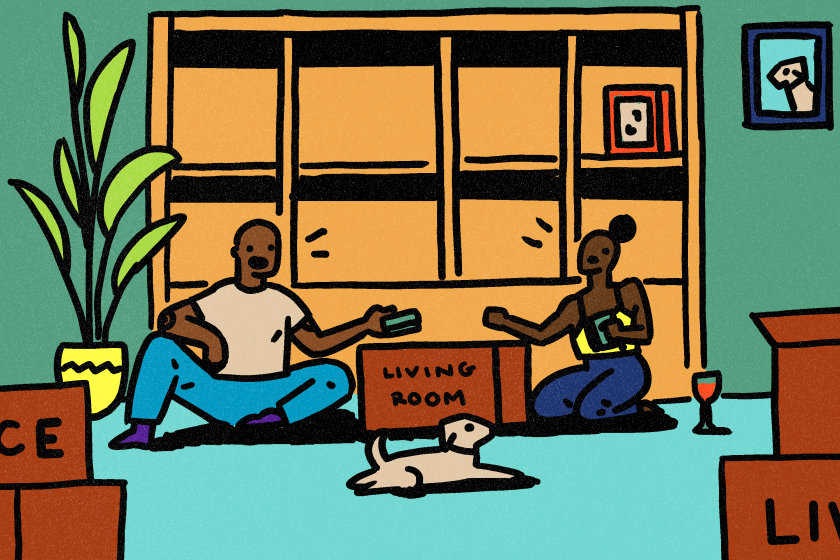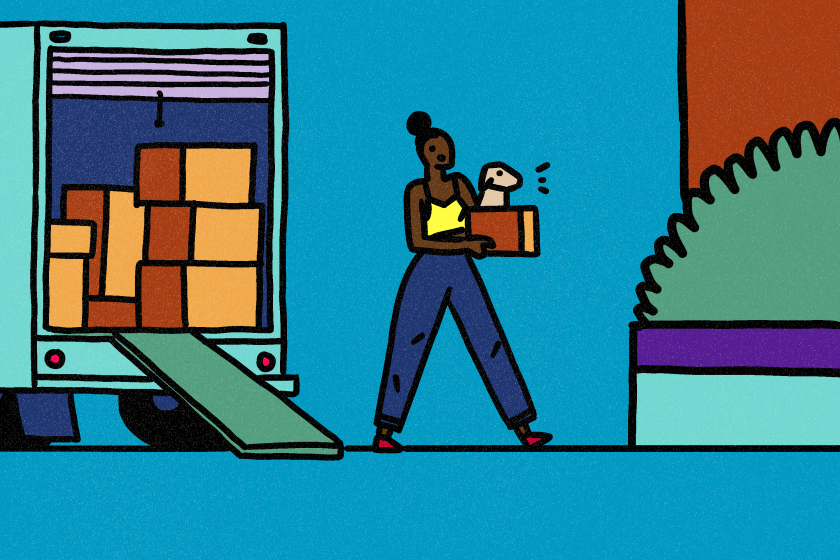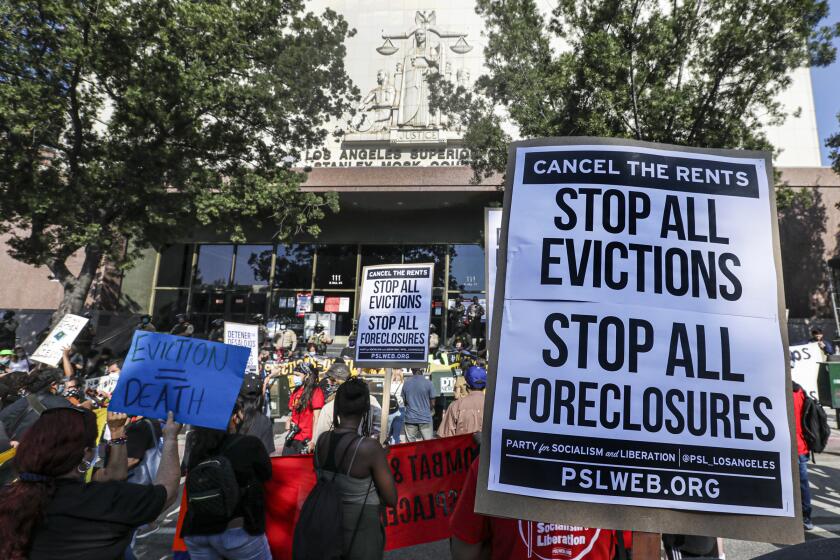How to find a compatible roommate
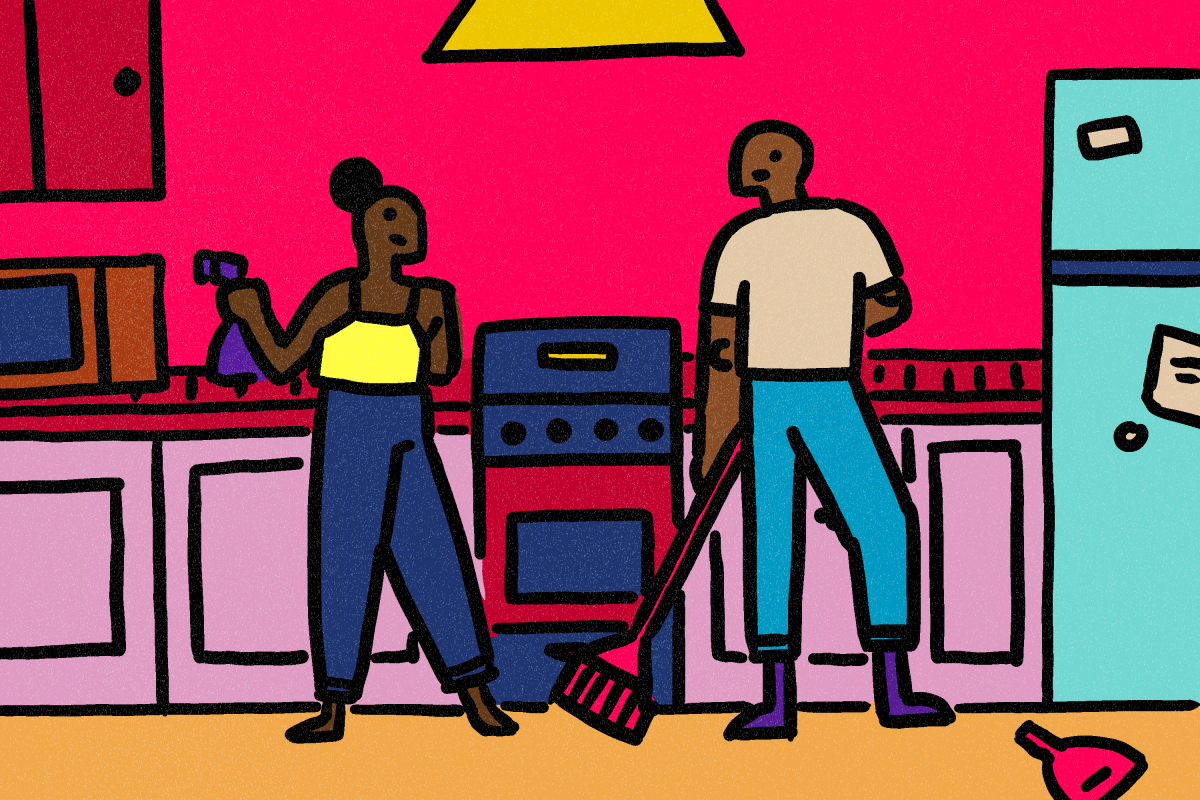
- Share via
“Someone might say, ‘I have a perfect roommate. We drink wine, watch DVDs, hang out and we’re best friends,’ ” said Matt Hutchinson, the communications director of SpareRoom. “And someone else might say, ‘I have the best roommate. I never see him.’”
Over the years, what people look for has changed, said Hutchinson, who has been in his role since 2007. SpareRoom helps users in the U.S. and U.K. find rooms and roommates, and fewer of them are now looking for a roommate who is OK with smoking inside, and more are concerned with finding someone who understands their vegetarianism, shares similar political views or takes a similar approach to safely navigating a pandemic.
“There’s no such thing as a perfect roommate,” he said. “There are just roommates that are perfect for you.”
He thinks finding compatible roommates is especially important for people moving to places like Los Angeles, New York or London — what he calls “suitcase and a dream” cities.
Often these residents are hoping to start a new life, and a bad roommate experience can result in stress, loneliness and a desire to give up.
“The cliche is that it’s about location, location, location, but the people are everything,” he said. “You can share a stunning penthouse apartment with three people you don’t like and have a miserable year, or you can share a really average apartment with two people you get along with amazingly and have the best year of your life.”
Here are some tips on how to find your perfect roommate — and how to get along once you find them.
Almost like finding a romantic partner
Nowadays, there are roommate search apps that function similarly to dating apps — down to profiles, chat requests and, in some cases, the ability to swipe right or left.
“If you date the wrong person, you can stop dating that person. But you move in with somebody, and you’re in the room next door to them for the next 12 months,” Hutchinson said.
In 2006, Ajay Yadav came to the U.S. from India to study engineering. He remembers taking a lot of time searching through Craigslist and Facebook, but feeling as though it wasn’t an efficient process.
In 2015, he founded Roomi, what he hoped would be like the professional networking site LinkedIn, but for roommates. In addition to verifying listings and offering background checks so users felt safe, Roomi gives users options to list their interests and personality traits in hopes of taking some of the guesswork out of the compatibility search.
Are you an early bird or a night owl? Are you a bookworm, an entrepreneur, a foodie, a health nut or a party person?
Hutchinson says this type of information makes for helpful icebreakers, but he stresses the importance of meeting potential roommates in person if you can — or over video if that’s not possible.
Yadav and Hutchinson say that people often want to find roommates they can hang out with, but they emphasize that good friends don’t necessarily make for good roommates if the two people have different living styles.
“You don’t need your roommate to be somebody who’s going to be your best friend for the next 20 years,” Hutchinson said. “But when it works, there are some amazing stories about people who met as roommates and went on to be great friends.”
Good dynamics become more important when there are multiple roommates.
Charles Dandino and Jeff Carlson are engineering co-workers who both live in co-ops, also known as collectives. Dandino lives in a house in Silver Lake with 10 roommates, and Carlson lives with nine other roommates in a house in East Hollywood. Each roommate has their own room, but spaces like the kitchen, living room, family room and yards are communal.
People are often rotating in and out, so they often end up interviewing new roommates multiple times a year.
They also start with a questionnaire. Carlson said that they’re often intrigued by people who will bring a different experience or perspective into their living situation. Dandino likes to ask how people handle conflict, what they can’t live without and how they identify.
In the past, Dandino’s and Carlson’s co-ops have hosted parties, dinners or other activities to get to know potential roommates. They try to give every roommate one-on-one time with the candidate.
And Carlson said they aim to have 100% consensus before inviting anyone to move in.
“Think of a roommate post like something between a dating post and a job interview,” said Ray Macfarlane, who helps run an LGBTQ roommates Facebook group for Las Vegas residents.
Macfarlane is the trans and gender diversity programs manager at the LGBTQ+ Center of Southern Nevada.
“You are advertising yourself as a roommate,” Macfarlane said. “Rather than making lists of demands or complaints about prior roommates, tell potential roommates what might be nice about living with you, what you bring to the table. After you’ve got the conversation going, then ask about schedules, how you feel about visitors, pets. Be creative about accommodating each other’s needs, and try to identify some interests you might have in common.”
Moving often brings a lot of stress and anxiety. But local moving professionals explain how some extra planning can make your move day go smoothly.
Trust your instincts
Dorm life may offer a clue to good roommate relationships. Robert Gonyea and Kevin Fosnacht, research scientists at Indiana University, have been studying first-year residence hall roommate assignment policies and how college roommates affect the experiences of incoming freshmen on campus.
There are two competing theories, they explain. One is that because those who choose their own roommates often choose people they know with similar backgrounds, it’s better for universities to encourage diverse experiences by randomly assigning roommates. The other theory suggests that it’s important for students to have a culturally engaging environment in which they’re comfortable being themselves. This is especially true for students from marginalized communities who are less likely to have that experience.
Gonyea and Fosnacht’s recent studies show that students are able to find diverse experiences on their own without prescribed roommate arrangements. And students of color report much more positive impressions of the school when they get to choose their own roommate.
“That is key,” Gonyea said. “New students might be more comfortable finding somebody who shares a lot of the same values or culture. That’s not to say they have to be the same race or the same religion, but that it’s your choice.”
“Can you talk about things you want to talk about without thinking you’re going to make them uncomfortable?” he added. “Can you cook the food that you want to?”
What you can do before, during and after your tenancy to get as much of your security deposit back as possible, plus what to do in case of a dispute with your landlord.
Be honest about what you’re like as a roommate
Fosnacht remembers that when he was looking for a roommate in Los Angeles, it often felt as though he had to market himself.
“You see a place that’s a good deal, and you’re like, ‘I’m the coolest guy. Just give me that rent control,’” he joked.
“But I’m a night owl,” he said. “If you’re up at 5 a.m. every day doing jumping jacks outside, I’m going to lose it.”
Hutchinson said that cleanliness is one of the most common complaints his website’s users have about their roommates.
“Everyone cleans to their own acceptable level of clean, and to them, that is clean,” Dandino said. “Really have that conversation.”
Dandino and Carlson love living in co-ops. They are able to constantly meet new people who come from diverse backgrounds and industries. There are often movie nights, activism meetings, gatherings around the fire pit where you can drop by as early as 7 p.m. and stay as late as 3 a.m.
“For the most part, the people who are drawn to living in a situation like this are people who get energy from sitting around a table and talking to people and sharing a drink,” Carlson said. “A lot of us use the shared space to recharge.”
But it’s not for everyone, so Dandino recommends just being truthful about how you live from the get-go.
“We’ve had people come in for an interview, we walked them around the house, and they walked right out,” Dandino said, laughing.
“We’ve had some of those too,” Carlson said. “And I respect that.”
“It’s much better than if they move in, and three weeks later, they decide this is not for them,” Dandino said.
If you are planning to rent an apartment or house and have a pet, here’s a guide to searching for the right place and negotiating with a landlord.
Understand the power dynamics in the roommate search
“We definitely see that it is easier to find a roommate when you are offering a room, rather than looking for one,” said Macfarlane, who uses the pronouns “they” and “them.” “Many people are looking for roommates because they can’t get a place on their own, need to share costs, maybe can’t prove double or triple income on their own or don’t have the rental history.”
Macfarlane’s group offers support to everyone, but they were especially concerned about finding roommates for those who are transgender or gender nonconforming.
“Even still in the [LGBTQ] roommate group, we see trans folks have a harder time getting responses because of discrimination,” they said.
S. Michael Gaddis, an assistant professor of sociology at UCLA, has worked on multiple studies looking at roommate discrimination through both fieldwork and surveys. One study looking at millennials, which was published in August, shows that there is still “social desirability” bias, and Black room-seekers — as well as Asian and Latino ones with nonwhite first names — receive significantly fewer responses in their searches.
“Even I’m surprised that essentially there is this larger narrative in society that younger people are more open to being friends of different races — and they’re not seeing race and ethnicity in the same way as older generations, because there’s more diversity, they’re growing up with it in schools. But at the first possible stage in their lives that they can make their own decisions, they reject it at pretty significant gaps,” Gaddis said.
These are inequities that are easier to point out and harder to solve, he said. But awareness is a start.
On a forum like the LGBTQ roommate Facebook group, Macfarlane recommends being proactive.
“Even if you don’t already have a place, I’d recommend describing the kind of place you’d like to get, the area you’d like to be and introduce yourself,” they said. “Also do this in comments to other people’s posts. Check back every so often for new posts, and know that it is a whole new pool of people week by week.”Work out your expectations in advance
“This part is boring,” Hutchinson said. “It’s like prenups; no one wants to talk about this stuff in advance. But talking about it before problems arise can avoid getting to the point of passive-aggressive notes on the fridge.”
Marianne Kilkenny is the founder of Women for Living in Community, which she started when she saw her parents in retirement homes and realized, “I want to live like ‘The Golden Girls.’” She is a spokesperson for the trend of baby boomer women “aging in community,” emphasizing their emotional needs as much as their healthcare ones.
She said there’s a different urgency for older people who are deciding whom they want to live with, compared with those who may see their current living situation as temporary. For her, it’s important to assess and build the interpersonal skills of the people assembled.
In her house, Kilkenny uses a Google Doc to work out details so that everyone is on the same page from the beginning.
Topics to consider:
- Cleanliness: Talk about dishes in the sink; how much clutter is too much clutter?
- Money: Who is paying for what and when?
- Food: Be clear about what you share and what you don’t share.
- Chores: Work out a schedule.
- Noise levels: What hours are quiet time?
- Temperature: Does anyone get cold really easily?
- Guests: Figure out what each person is comfortable with, especially during the pandemic.
- Pets: Is anyone allergic? Who cleans up?
- Significant others: Hutchinson said he learned about the “boyfriend rule” (which works for all significant others) from SpareRoom users. “If you have a partner now or in the future, they can stay over as many nights a week as you stay at theirs,” he explains. “So you never have someone over for more than half a week. That’s a simple common-sense one, and simple is always good.”
If you’re like most people in Southern California, you live in a rental.
After you move in with that ‘perfect roommate’
If and when conflict arises, which is natural, address it early so that tension doesn’t build.
“When you have a conflict with your close friend, you have a lot of relationship groundwork built. So when they do something, you can just ask, ‘What was that about?’” Dandino said. “But with somebody you don’t spend a lot of time with, those interactions that can be confused are more likely to be confused, and it’s much more uncomfortable to follow up and check in.”
Carlson said the people in his household make it a point to check in when they notice someone is unhappy.
Hutchinson said it’s important to remember that everybody behaves badly when they are stressed. You’re often unable to hide that bad behavior from someone living with you.
“The more you can remember that, the more you can communicate, the better,” he said. “Just remembering that everybody else might not have had a very great day either.... And if we can help each other through that, then we’re on the right track.”
More to Read
Sign up for Essential California
The most important California stories and recommendations in your inbox every morning.
You may occasionally receive promotional content from the Los Angeles Times.

